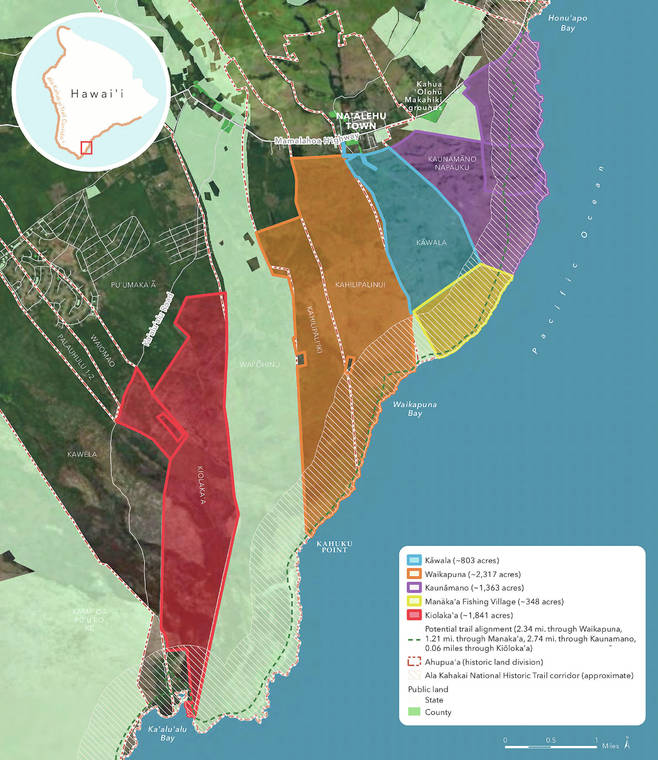The state Board of Land and Natural Resources on Friday approved a $1.5 million grant to the Ala Kahakai Trail Association to buy nearly 2,000 acres in Ka‘u.
At a BLNR meeting, Ka‘u residents debated the merits of the association — an organization which seeks to purchase and preserve land around the island for a trail network — and its intent to purchase a 1,841-acre parcel using $1.47 million in DLNR Land Conservation Grant funds.
Ala Kahakai Association board member Keoni Fox said the association wants to purchase a narrow strip of land south of Naalehu stretching from Ka‘alu‘alu Road to Ka‘alu‘alu Bay in order to preserve the local ecosystem. This parcel, called Kiolaka‘a, is adjacent to several other properties along the Ka‘u coast that have already been purchased by the association.
Fox said the association’s plans have been largely popular among Ka‘u residents at several community meetings over the last few years. However, while most residents agree with the broad principles of land preservation, Fox said some residents oppose the purchase out of mistrust of the association.
Several of those residents testified at Friday’s meeting. Resident Kaweni Ibarra said he ultimately cannot trust Ala Kahakai to manage the land, and called the association’s efforts a “land grab” that was a continuation of the genocide and disenfranchisement of native people by the West.
“We should be talking about what is colonial,” Ibarra said. “The way that Ala Kahakai has operated so far has been colonial. …Their plan to acquire land first and work out the details later is colonial. So, I can’t trust this group of people taking over so much responsibility when they’ve already proven to me that they don’t respect us.
“I apologize for being blunt, but the truth is … a lot of the people speaking on Ka‘u come from the comfort of a place that is not Ka‘u,” Ibarra concluded. “A lot of you speaking on this aren’t affected like our kupuna and those who depend on these resources to feed their families are.”
Other testifiers echoed Ibarra’s comments, and written testimony included petitions carrying dozens of signatures urging the BLNR to deny the grant application.
Letters to the board accused the association of failing to do sufficient community outreach among neighborhoods affected by previous land purchases, or restricting access to previous land purchases.
However, other testifiers were in support of the acquisition, with some Ka‘u residents contradicting accusations by Ala Kahakai opponents. Ka‘u rancher Michelle Galimba said an accusation that Ala Kahakai had blocked access to a neighboring parcel was untrue, and that ranch owners on that parcel had restricted access for decades before it was purchased by Ala Kahakai.
John Replogle, chair of the Windward Planning Commission, testified in support of the acquisition, saying the importance of Ala Kahakai’s land preservation efforts exceeds that of neighborhood squabbles.
“The most important issue to me is protecting the land,” Replogle said. “In, I don’t know, 50, 75 years, we won’t be here, and all this we’re bickering about will be moot. But the land will still be here. …We have the potential to create the eighth wonder of the world.”
Fox responded to criticism from residents by making commitments to invite Ka‘u residents and organizations to partner on Kiolaka‘a stewardship projects and add Ka‘u residents to the association board. He added that, in the future, the association might transfer the property to a capable Ka‘u nonprofit.
The board voted unanimously to award the grant to Ala Kahakai.
Email Michael Brestovansky at mbrestovansky@hawaiitribune-herald.com.






